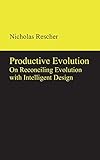Productive Evolution : On Reconciling Evolution with Intelligent Design / Nicholas Rescher.
Material type: TextPublisher: Berlin ; Boston : De Gruyter, [2013]Copyright date: ©2011Description: 1 online resourceContent type:
TextPublisher: Berlin ; Boston : De Gruyter, [2013]Copyright date: ©2011Description: 1 online resourceContent type: - 9783110319958
- 9783110320145
- BL263 -- R47 2011eb
- online - DeGruyter
| Item type | Current library | Call number | URL | Status | Notes | Barcode | |
|---|---|---|---|---|---|---|---|
 eBook
eBook
|
Biblioteca "Angelicum" Pont. Univ. S.Tommaso d'Aquino Nuvola online | online - DeGruyter (Browse shelf(Opens below)) | Online access | Not for loan (Accesso limitato) | Accesso per gli utenti autorizzati / Access for authorized users | (dgr)9783110320145 |
Browsing Biblioteca "Angelicum" Pont. Univ. S.Tommaso d'Aquino shelves, Shelving location: Nuvola online Close shelf browser (Hides shelf browser)

|

|

|

|

|

|

|
||
| online - DeGruyter Das Problem des perzeptiven Wissens / | online - DeGruyter Funktionale-Rollen-Semantik : Bedeutung zwischen Externalismus und Holismus / | online - DeGruyter Philosophical Episodes / | online - DeGruyter Productive Evolution : On Reconciling Evolution with Intelligent Design / | online - DeGruyter The Right to Believe : Perspectives in Religious Epistemology / | online - DeGruyter Reflexivity : From Paradox to Consciousness / | online - DeGruyter The True Countenance of Man : Science and Belief as Coordinate Magisteria (COMA) - A Theory of Knowledge / |
Frontmatter -- Table of Contents -- PREFACE -- Chapter One: EVOLUTIONARY PROCESSES -- Chapter 2: HOMO SAPIENS AND THE EVOLUTION OF INTELLIGENCE -- Chapter Three: AMPHIBIOUS MAN: THE EVOLUTION OF IMAGINATION -- Chapter 4: THE CULTURAL EVOLUTION OF COMMUNAL PRACTICES IN INQUIRY -- Chapter 5: RATIONAL SELECTION: THE CASE OF SCIENTIFIC METHOD -- Chapter 6: MIND/MATTER COORDINATION AND THE EVOLUTION OF THE WILL -- Chapter 7: EVOLUTION AND INTELLIGENT DESIGN -- Chapter 8: MEETING THEOLOGICAL OBJECTIONS TO EVOLUTION -- Chapter 9: MEETING SCIENTISTIC OBJECTIONS TO INTELLIGENT DESIGN -- References -- Name Index
restricted access online access with authorization star
http://purl.org/coar/access_right/c_16ec
A doctrine of intelligent design through evolution is not going to find many friends. It is destined to encounter opposition on all sides. Among scientists the backlog of evolution will have little patience for intelligent design. Among religiousists, many who form intelligent design have their doubts about evolution. In the general public's mind there is a diametrical opposition between evolution and intelligent design: one excludes the other. This book will argue that this view of the matter is not correct, and that in actuality one can regard evolution itself as a pathway to intelligent design. We would do well to go beyond The Origin of Species and-taking as our guide such works as W. Wentworth Thomson's On Growth and Form acknowledging that evolutionary adaptation can result in solutions of a sort that intelligence could readily ratify. Accordingly, what the present book seeks is a naturalization of Intelligent Design that sees such design as itself the result of natural and evolutionary processes.
Mode of access: Internet via World Wide Web.
In English.
Description based on online resource; title from PDF title page (publisher's Web site, viewed 08. Jul 2019)


